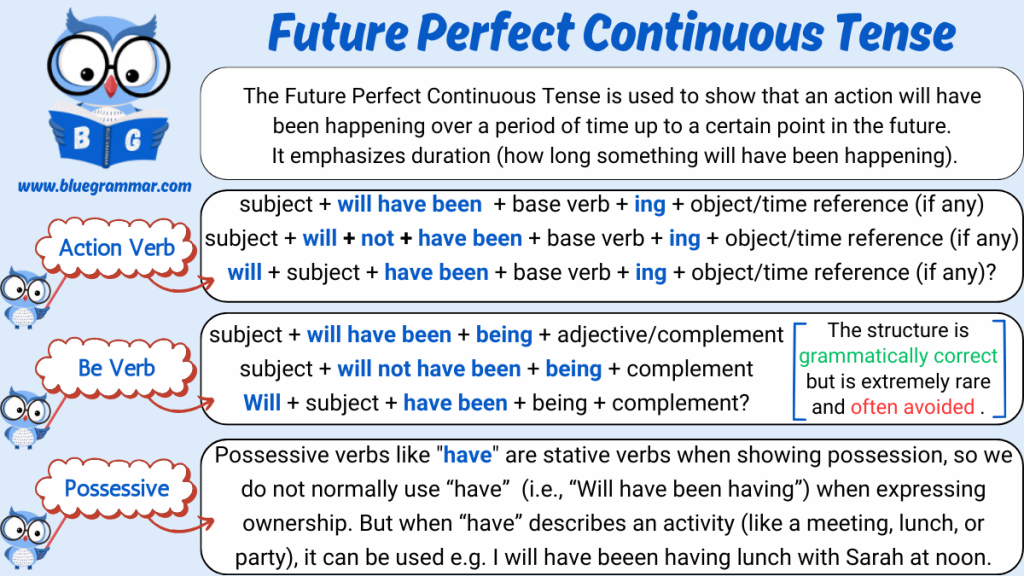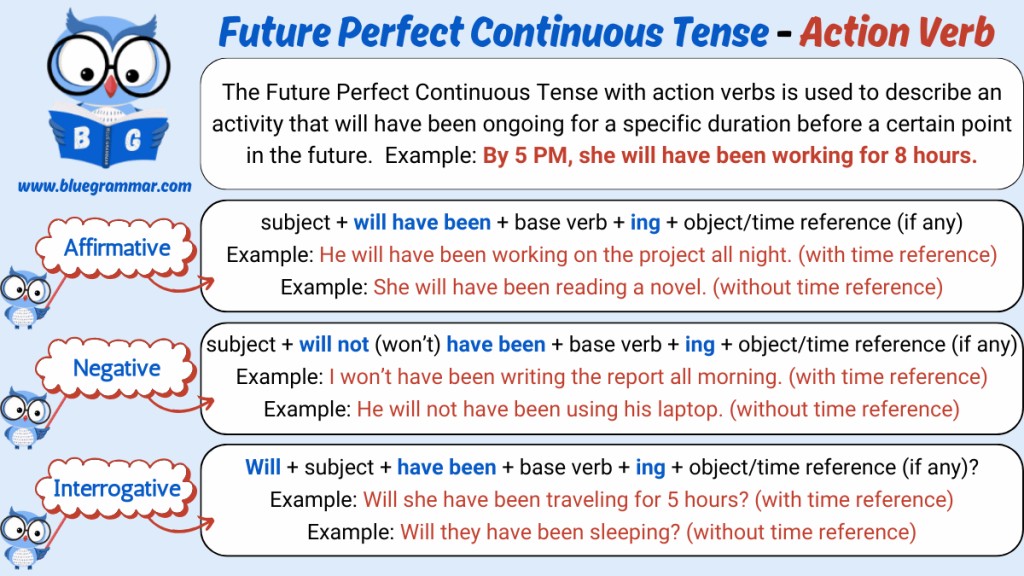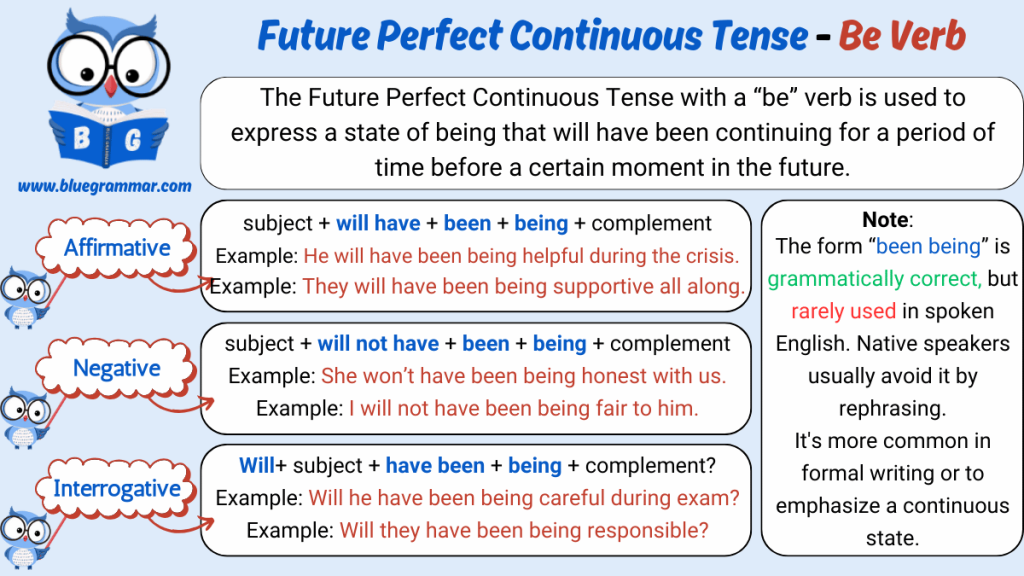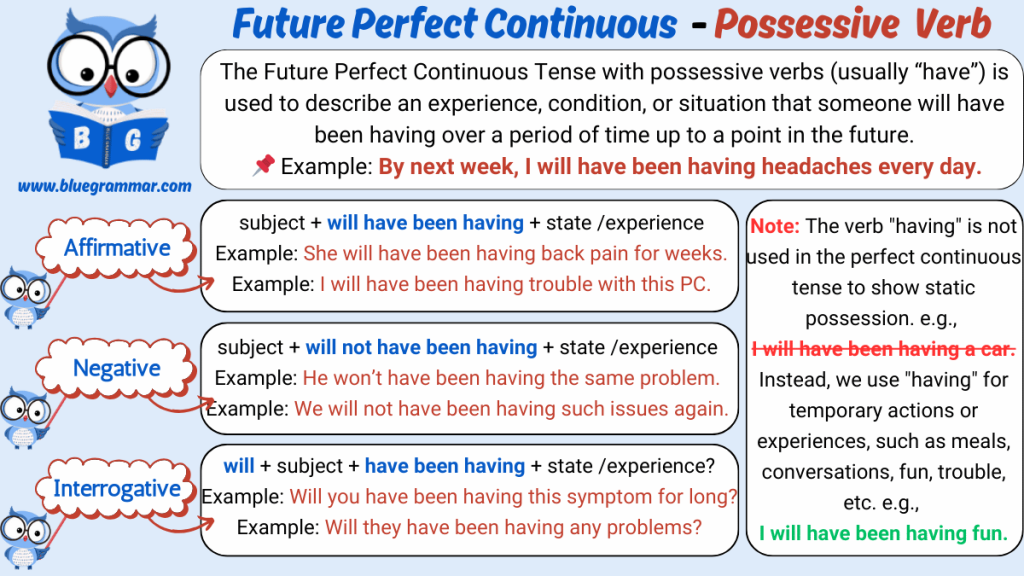
The Future Perfect Continuous Tense is used to describe actions that will be ongoing up until a certain point in the future. It emphasizes the duration of an activity that will have been in progress before a specific future time. This tense is used to highlight how long an action will have been happening by a particular time in the future.
Future Perfect Continuous Tense : Action Verb
Why We Use Action Verbs in Future Perfect Continuous Tense?
Action verbs are used in the Future Perfect Continuous Tense to describe actions that will be ongoing and will have been happening continuously up to a future point. These verbs focus on the duration of the action, emphasizing that it will be in progress until the specified future time. This tense is commonly used:
- To express the duration of an action that will be happening before a specific future time.
- To show that an action will have been ongoing for a period of time up to that point.
- To talk about future actions that have a clear start and end time, but will continue over a period of time.
Time expressions often used with the Future Perfect Continuous include:
- By this time next week
- By the end of the year
- For two hours
- By the time I arrive
- In five years

Structure for Positive Sentences
Subject + will have been + verb(-ing) + object/time phrase (if any)
Examples:
- I will have been working for three hours by 5 PM.
- She will have been studying all day by the time we arrive.
- They will have been traveling for six months by next June.
- We will have been living in this house for five years by the time we move.
- He will have been waiting for you for an hour when you get there.
- You will have been practicing for two hours by the end of the session.
- The children will have been playing outside for three hours by the time we return.
Structure for Negative Sentences
Subject + will not have been (won’t have been) + verb(-ing) + object/time
Examples:
- I won’t have been working here for long by next month.
- She will not have been studying for the exam by 6 PM.
- They won’t have been traveling for long by the time we meet.
- He won’t have been practicing for more than an hour by the time the session ends.
- We will not have been waiting for you when you arrive.
Structure for Interrogative Sentences
Will + subject + have been + verb(-ing) + object/time?
Examples:
- Will you have been working on the project by the time I get there?
- Will she have been studying for the test by next week?
- Will they have been practicing for the match by then?
- Will we have been living here for a year by the time the renovation is complete?
- Will he have been waiting for long when we arrive?
Future Perfect Continuous Tense : Be Verb
Why We Use Be Verbs in Future Perfect Continuous Tense?
The verb “be” is used in the Future Perfect Continuous Tense to express the idea of a continuous action that will be happening for a specific duration up until a future time. This tense indicates that the action will have been in progress, emphasizing the duration and ongoing nature of the activity

Structure for Positive Sentences
Subject + will have been + being + adjective/noun
Examples:
- He will have been being careful with his health by the time the marathon starts.
- You will have been being very patient throughout the process.
Structure for Negative Sentences
Subject + will not have been (won’t have been) + being + adjective/noun
Examples:
- She won’t have been being careful with the materials by then.
- They will not have been being honest in their report.
Structure for Interrogative Sentences
Will + subject + have been + being + adjective/noun?
Examples:
- Will he have been being productive by this time tomorrow?
- Will they have been being cooperative during the meeting?
Future Perfect Continuous Tense : Possessive Verb
Possessive verbs like “have” and “own” generally do not appear in continuous tenses as they express states, not actions. However, when “have” refers to temporary experiences or activities (like having lunch or having a meeting), it can be used in the Future Perfect Continuous Tense to show that the action will have been ongoing for a certain period of time.

Structure for Positive Sentences
Subject + will have been + having + object/experience
Examples:
- I will have been having lunch with my colleagues for an hour by the time you arrive.
- She will have been having meetings all day by the time the conference ends.
Structure for Negative Sentences
Subject + will not have been (won’t have been) + having + object/experience
Examples:
- I won’t have been having dinner by the time you reach home.
- They will not have been having their break when we arrive.
Structure for Interrogative Sentences
Will + subject + have been + having + object/experience?
Examples:
- Will you have been having lunch by the time I get there?
- Will he have been having meetings all day by tomorrow?
Important Notes:
Use Future Perfect Continuous to emphasize the ongoing duration of an action that will be completed before a specific point in the future.
- Correct: I will have been working for five hours by 6 PM.
- Incorrect: I will work for five hours by 6 PM. (This is Future Simple.)
This tense is used when you want to focus on the duration of an activity rather than its completion.
Time expressions like “by then,” “by next year,” and “for five hours” add clarity to the Future Perfect Continuous tense.
Stative verbs (such as “own,” “belong,” “seem”) are typically not used in the Future Perfect Continuous because they describe conditions, not actions.